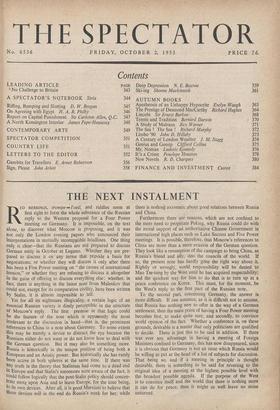THE NEXT INSTALMENT
Yet for all its nightmare illogicality, a certain logic of an essential Russian variety is dimly perceptible in the structure of Moscow's reply. The first premise in that logic could be the feature of the note which is apparently the most irrelevant to the discussion in hand—that is, the prominent references to China in a note about Germany. To some extent this may be merely a device to distract the eye because the Russians either do not want or do not know how to deal with the German question. But it may also be something more. Russia is historically in the unique position of being both a European and an Asiatic power. But historically she has rarely been active in both spheres at the same time. If there was any truth in the theory that Stalinism had come to a dead end in Europe and that Stalin's successors were aware of the fact, it Could follow logically that the post-Stalin policy should concen- trate more, upon Asia and to leave Europe, for the time being, to its own devices. After all, it is good Marxism to believe that those devices will in the end do Russia's work for her; while there is nothing axiomatic about good relations betweeh Russia and China.
Furthermore there are reasons, which are not confined to the mere need to propitiate Peking, why Russia could do with the moral support of an authoritative Chinese Government in international high places such as Lake Success and Five Power meetings. It is possible, therefore, that Moscow's references to China are more than a mere evasion of the German question. They look like a resumption of the campaign to bring China, as Russia's friend and ally, into the councils of the world. If . so, the present note has hardly gone the right way about it. Rightly or wrongly, world responsibility will be denied to Mao Tse-tung by the West until he has acquired respectability; and the quickest way for him to do that is to turn up at a peace conference on Korea. This must, for the moment, be the West's reply to the first part of the Russian note.
To the second part, concerning Germany, the answer is more difficult. If one assumes, as it is difficult not to assume, that Russia has nothing new to offer in the way of a German settlement, then the main point of having a Four Power meeting becomes first,.to make quite sure, and secondly, to convince world opinion of the fact. Whether a conference is, on these grounds, desirable is a matter that only politicians are qualified to decide. There is just this to be said in addition. If there was ever any advantage in having a meeting of Foreign Ministers confined to Germany, this has now disappeared, since it is obvious that Germany is not an issue which Russia would be willing to put at the head of a list of subjects for discussion. That being so, and if a meeting in principle is thought desirable, there is something to be said for reverting to the original idea of a meeting at the highest possible level with the broadest' possible agenda. If the purpose of the West is to convince itself and the world that there is nothing more it can do for peace, then it might as well leave no stone unturned.


















































 Previous page
Previous page